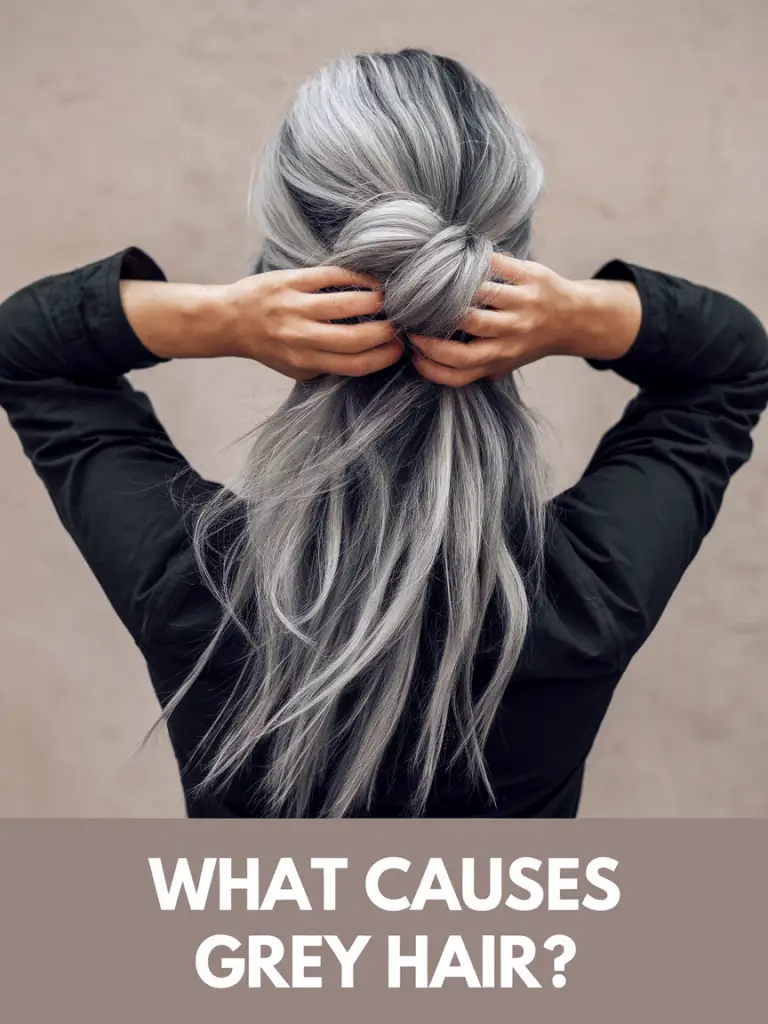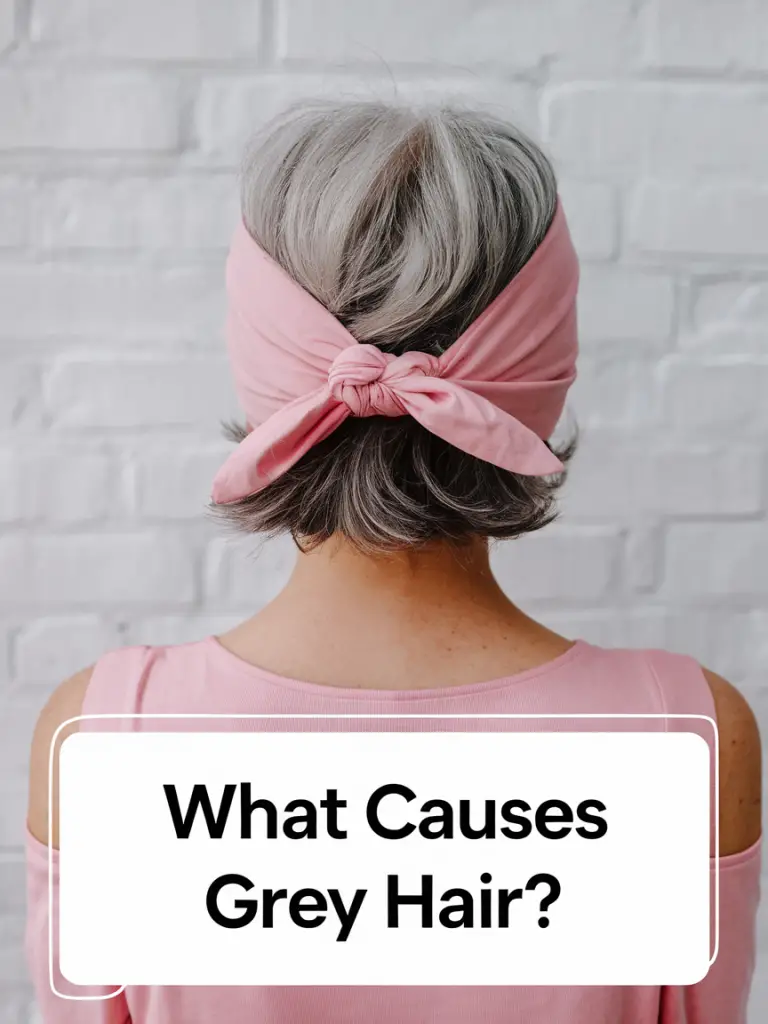What Causes Grey Hair?
“I’ve noticed my hair is going grey. Why is that?” You may have noticed a few grey hairs and wondered what it meant. The silver shade of hair is, in fact, one of the most common signs of getting old. It’s still one of the characteristics associated with the ageing process. There are lots of reasons why we get grey hair, including genetics and lifestyle. It’s not just down to a biological clock. We’re going to take a closer look at how we can explain grey hair scientifically, what causes it and what we can do to slow it down.

The Science of Grey Hair
The colour of our hair is down to the melanin pigment that’s produced in our hair follicles by special cells called melanocytes. As we get older, the melanocytes produce less and less melanin, which is why our hair turns from grey to white. The colour-changing can happen gradually over time, and it depends on your genome, nationality or health.
Age and Genetics
The most common reason for grey hair is simply that people get older. Most people notice their first grey hair in their 30s, usually around the age of 35. It’s not set in stone, though. Some European people start going grey in their early 30s, while others in their 40s. The same goes for people of African or Asian descent. If your family had grey hair when they were young, there’s a good chance you might have the same.
Other Causes of Grey Hair
While ageing is the main issue, other factors could also play a part in speeding up the process. The main factors are:
Oxidative Stress
Oxidative stress is when there’s an imbalance of free radicals and antioxidants in the body. Free radicals are atoms that can be dangerous. They’re produced when people try to be healthy by avoiding pollution, smoking, eating an unhealthy diet, and exposure to ultraviolet radiation. All of these things are in the environment and can be dangerous. These harmful substances affect melanocytes, which can lead to premature greying. On top of that, stress can also speed up the process.
Smoking
It used to be thought that smoking was the main cause of hair going grey before its time. People who smoke tend to go grey almost two and a half times as fast as non-smokers. It’s thought that the chemicals in cigarettes are harmful to hair follicles and affect the ageing process.
Vitamin Deficiencies
Hair greying is a side effect of vitamin deficiencies. Bad nutrition, particularly of vitamins B12 and D, is responsible for it. If you don’t get the right nutrients, like vitamin B12, your hair can start to grey prematurely. The same goes for vitamin D, which is important for hair health. A poor diet and low levels of these nutrients can affect your hair’s pigmentation and growth. It’s important to get more of these nutrients into your diet.
Hormonal Changes
Another reason for premature greying is hormonal imbalances caused by thyroid problems. Issues with the thyroid, such as hypothyroidism or hyperthyroidism, can disrupt melanocytes in the feet, which might result in greyish hair appearing earlier than usual if it persists for a while.
Autoimmune Disorders
Disorders of the immune system, including things like vitiligo or alopecia areata, are also involved in the process. Grey hair is caused by the immune system destroying melanocytes, which leads to the hair turning grey or even losing all its colour or just patches of it.
| Factor | Description |
|---|---|
| Aging | Natural decline in melanin production with age |
| Genetics | Inherited tendency for early or late greying |
| Oxidative Stress | Damage caused by free radicals |
| Vitamin Deficiencies | Lack of B12, D, and antioxidants |
| Smoking | Linked to premature greying, speeding up the process |

Can Grey Hair Be Prevented or Reversed?
At the moment, there’s no scientific proof that you can stop or even reverse grey hair. There are a few lifestyle choices and treatments that can help to slow down the process.
Healthy Diet
It’s really important to eat a diet that’s full of antioxidants, vitamins (like B12 and D) and minerals if you want your hair to be in great shape. Foods that contain these nutrients, such as vegetables, nuts, seeds and fish, can help to strengthen hair pigment.
Stress Management
Given that stress is linked to oxidative damage, GM food could well be the answer, unless we consider the impact of stress-relief techniques such as yoga, meditation and regular exercise, which can influence the chemicals in our hair. If we can stop the hair cells being killed by the chlorine and get rid of the UV rays, it should help stop the greying process.
Smoking Cessation
Cessation of smoking can have a positive impact on both general health and premature greying prevention.
Sun Protection
If you protect your head from UV damage, it can help keep your hair roots strong and delay greying.
Potential Treatments
While grey hair is something we can’t change, new therapies are focusing on keeping our melanocytes healthy and reducing oxidative stress. For example, pseudocatalase is a component used in a few cosmetic products that claim to help slow down the greying process. Also, scientists are trying to create gene therapies that could stop or even reverse grey hair in the future.
Managing Grey Hair
Grey hair can affect more than just your colour. It can also lead to hair that’s weaker and less textured. It’s important to take care of grey hair to keep it healthy.
Moisturizing Products
Grey hair can lose its natural oil, become dry and brittle. Using moisturising shampoos, conditioners and hair oils can help keep your hair smooth and manageable.
Gentle Hair Care
Just a heads-up: don’t overheat the style or use harsh chemicals, as this can damage the already brittle and grey strands.
Regular Trimming
It’s normal for hair to have split ends, but they often need trimming to stay healthy and strong.
Table: Nutritional Elements for Hair Health
| Nutrient | Role in Preventing Greying | Sources |
|---|---|---|
| Vitamin B12 | Supports healthy hair growth and pigmentation | Meat, fish, dairy |
| Vitamin D | Linked to overall hair health | Sun exposure, fish, eggs |
| Copper | Essential for melanin production | Nuts, seeds, whole grains |
| Zinc | Helps maintain healthy hair pigment production | Meat, shellfish, legumes |
Cultural and Psychological Perspectives
While hair colour changing is a natural thing for most of us, it can be a worry for some people. The “silver pride” movement has had a positive impact. It’s shown that people can look even more stunning by embracing their grey hairs. This is a visual representation of a person’s depth of character and life experiences. This has led to a change in how people see grey hair. It’s no longer something to be ashamed of, but rather a source of pride.

Conclusion
Most people in the ageing population will experience grey hair at some point. However, the rate at which it happens can be influenced by a number of factors, including genetics, lifestyle choices and environmental conditions. While there’s no way to stop grey hair from happening, you can slow it down by leading a healthy lifestyle, managing stress, and using protective hair products. If you decide to embrace your grey hair or take steps to manage it, remember that it can be both beautiful and empowering.
Frequently Asked Questions (FAQs)
1. Can stress cause grey hair?
Yes, stress can cause hair to turn grey more quickly, which in turn damages melanocytes. If you learn relaxation techniques, you can reduce your stress levels, which in turn slows down the process.
2. Can smoking cause premature greying?
Yes, it’s true that smoking causes hair to grey. This is down to damage to the hair follicles, as well as a reduction in melanin production.
3. Can grey hair be reversed?
There aren’t any documented cures yet, but treatments that reduce oxidative stress might still be able to slow the process down.
4. Can grey hair grow back as its original color?
Some people have noticed that their hair has regained its original colour after some treatments. In a few cases, it has even gone back to its natural colour. However, these cases are few and far between.
